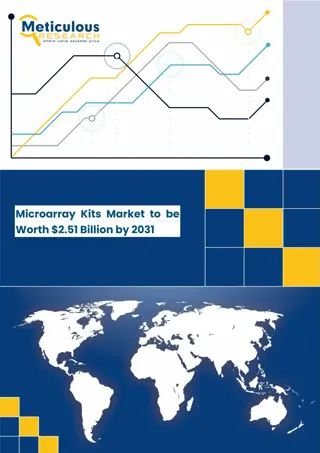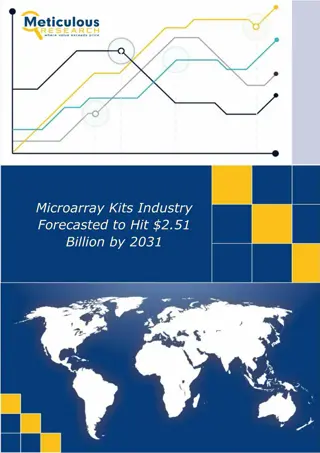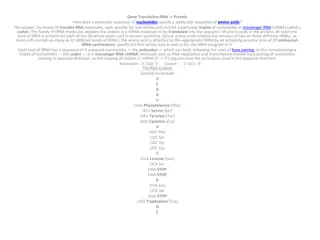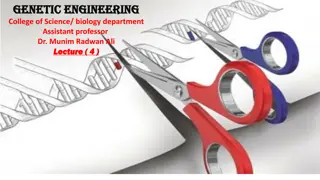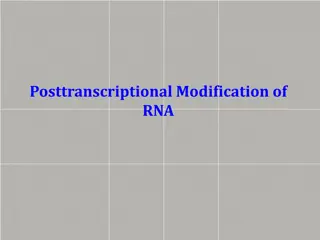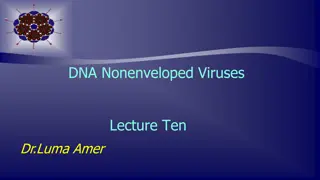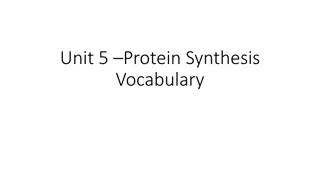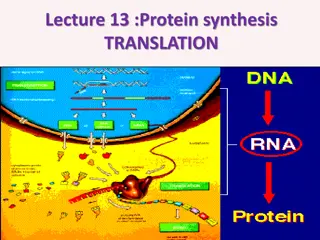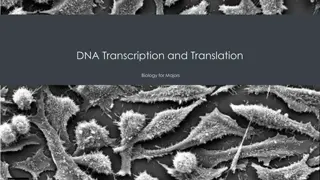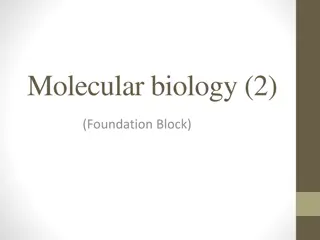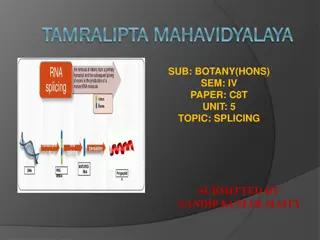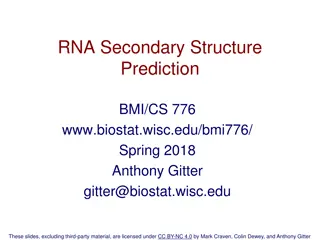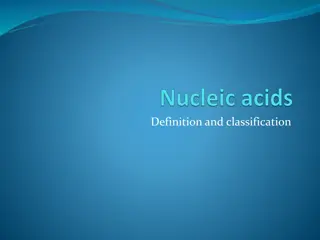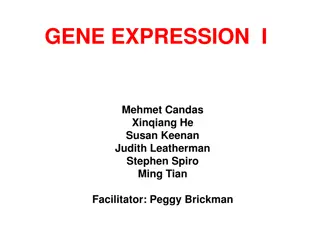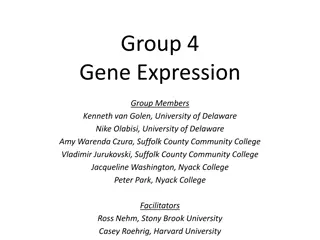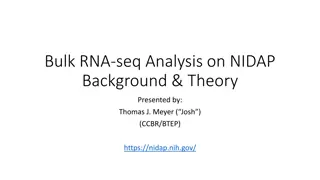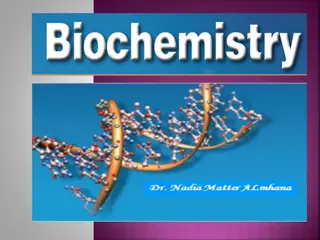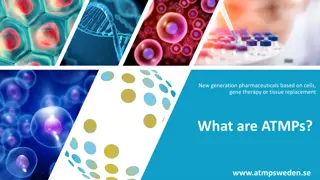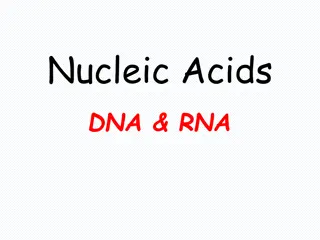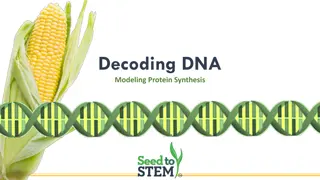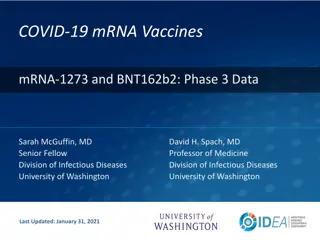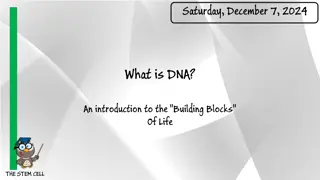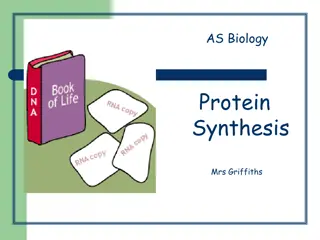mRNA Chromatography Applications: Resin Types and Purification Efficiency
This content delves into mRNA chromatography applications, focusing on the mRNA purification process using dT affinity chromatography, IEX, HIC, and RP techniques. It discusses the application of mRNA affinity resins like Monomix dT20 and Proteomix POR50-dT20, highlighting their properties, purifica
4 views • 8 slides
Microarray Kits Market
Microarray Kits Market by Product Type (DNA [cDNA, Oligo, BAC, SNP], RNA, Protein, Tissue), Application (Drug Discovery & Development, Research, Diagnostic), End User (CRO, Pharma & Biotech, Academic, Hospital & Diagnostic Lab) \u2013 Global Forecast to 2031\n
10 views • 4 slides
Microarray Kits Industry Forecasted to Hit $2.51 Billion by 2031
The global market for microarray kits encompasses a diverse range of products tailored for various applications across multiple industries. These kits are categorized by product type, including DNA (such as cDNA, Oligo, BAC, and SNP), RNA, protein, and tissue-based kits. \n
0 views • 3 slides
Understanding Gene Translation: From RNA to Protein
Gene translation from RNA to protein involves the specific binding of transfer RNA molecules to messenger RNA codons, enabling the translation of nucleotide sequences into amino acids. Each amino acid is attached to a specific tRNA through activating enzymes, and the anticodon on tRNA pairs with the
0 views • 4 slides
Understanding the Construction of cDNA Library by Kamal Kumar Gupta
cDNA library construction involves isolating mRNA, converting it to cDNA using reverse transcriptase, and synthesizing a complementary DNA strand. The resulting library is enriched with actively transcribed gene fragments, making it valuable for eukaryotic gene analysis. However, cDNA libraries lack
0 views • 14 slides
Understanding the Relationship Between DNA and Protein Specificity
The relationship between an organism's DNA and protein specificity is intricate. DNA encodes the information for the sequence of amino acids in proteins, thereby determining their specificity. This process involves DNA directing the synthesis of specific RNA molecules, which are then translated into
0 views • 17 slides
Insights into Enzymes in Genetic Engineering
Discover the role of enzymes like Polynucleotide Phosphorylase, Deoxyribonuclease, and Phosphatase in genetic engineering processes. Learn how these enzymes regulate mRNA processing, DNA cleavage, and phosphate group cleavage, crucial for various applications in biotechnology.
0 views • 13 slides
Posttranscriptional Modification of RNA Overview
A primary transcript is the initial RNA copy of a transcription unit, subject to posttranscriptional modifications like cleavage and further alterations to form functional tRNAs, rRNAs, and mRNAs. In eukaryotic cells, pre-rRNAs and pre-tRNAs undergo processing by ribonucleases to yield mature RNA sp
0 views • 12 slides
Understanding Adenoviruses: Structure, Replication, and Epidemiology
Adenoviruses, known for causing respiratory infections, have at least 41 serotypes categorized into 6 subgenera. Their structure includes 252 capsomeres, 240 hexons, and specific proteins for attachment. The replication involves virus attachment, penetration, uncoating, and transportation of viral D
0 views • 22 slides
Understanding Protein Synthesis Process in Cells
Explore the key terms related to protein synthesis: RNA, mRNA, rRNA, tRNA, protein synthesis, transcription, translation, amino acid, codon, and anticodon. Understand the intricate process of protein formation through transcription and translation steps.
0 views • 11 slides
Understanding Protein Synthesis and Translation Process
Proteins play a crucial role in various body structures and functions. The process of translation, as per the central dogma, involves converting genetic information from DNA to functional proteins through transcription and translation. This process includes initiation, elongation, and termination st
1 views • 25 slides
Biology Power Standards Learning Targets and Essential Questions
This educational material covers Biology Power Standards related to DNA structure, protein synthesis, genetic variations, meiosis, mutations, and natural selection. Essential questions are provided for each standard, focused on topics like mRNA, DNA duplication, enzyme polymerase, and the relationsh
0 views • 13 slides
Global mRNA Therapeutics Market
The Global mRNA Therapeutics Market Size is expected to reach USD 38.15 Billion by 2030, at a CAGR of 2.2% during the forecast period 2022 to 2030.\n\n
1 views • 5 slides
Analysis of mRNA Technology Transfer Programme in the Global South: Pros, Cons, and Future Directions
The mRNA technology transfer programme in the Global South aims to enhance health security by establishing mRNA manufacturing capabilities in low- and middle-income countries. The programme, led by Afrigen in South Africa, focuses on empowering LMICs to produce mRNA vaccines initially for COVID-19,
0 views • 9 slides
Understanding Protein Production and the Genetic Code in Biology Class
In this biology lesson, students learn about Messenger RNA (mRNA) and its role in protein synthesis. They explore the history of DNA discovery, study leading biologists, and understand the significance of proteins in growth, repair, and other functions in organisms. The lesson also revisits the gene
0 views • 47 slides
Understanding COVID-19 Vaccination: Myths, Facts, and Global Impact
Learn about the Phase One Inoculation Webinar, dispel vaccine myths and misinformation, understand the relationship between 5G and viruses, compare COVID-19 cases and deaths globally, and discover the importance of vaccination in saving lives. The content emphasizes the distinction between myths and
0 views • 8 slides
Understanding Transcription and Translation in Protein Synthesis
Protein structure is composed of amino acids arranged in specific orders to form polypeptides. This process involves transcription of DNA into RNA followed by translation of RNA into proteins. Replication plays a crucial role in preparing DNA for cell division. The central dogma of molecular biology
0 views • 24 slides
Understanding Transcription and Gene Expression in Biology
Explore the intricate process of transcription in biology, where mRNA is synthesized from DNA to carry the genetic code for protein production. Learn about the connection between genotype and phenotype, the role of genes in protein synthesis, and the significance of terms such as RNA Polymerase, int
0 views • 16 slides
Understanding DNA Transcription and Translation in Biology
DNA transcription is the process where DNA is used as a template to create mRNA in the nucleus. This mRNA is complementary to the DNA and goes through initiation, elongation, and termination stages. RNA polymerases are essential for this process in eukaryotes. Various RNA polymerases have specific f
0 views • 47 slides
Molecular Biology Concepts Overview
Explore key concepts in molecular biology including DNA replication, transcription, translation, and the central dogma. Understand the roles of DNA, RNA, ribosomes, and proteins in genetic processes. Visual aids and analogies help simplify complex processes such as the decoding of mRNA messages and
0 views • 19 slides
Understanding DNA Replication and Genetic Transcription
Explore the fundamental concepts of molecular biology focusing on DNA replication, transcription of genetic material into mRNA, and translation into functional proteins. Learn about the semiconservative nature of Eukaryotic DNA replication, the proteins involved, steps in the replication process, an
0 views • 25 slides
Understanding COVID-19 Vaccines: Safety, Effectiveness, and Immunity
COVID-19 vaccines play a crucial role in preventing illness by helping the body develop immunity to the SARS-CoV-2 virus. Vaccines like Pfizer-BioNTech and Moderna utilize mRNA technology to trigger the immune system to produce antibodies against the virus. These vaccines are safe, effective, and pr
0 views • 15 slides
Understanding Ecology and Biodiversity
Ecology explores the dynamic interactions between living (biotic) and non-living (abiotic) factors in ecosystems. It delves into selective breeding, protein structure, hormones, placenta function, and the vulnerability of embryos during early development. Meiosis, mRNA translation, feedback mechanis
0 views • 25 slides
Understanding RNA and Protein Synthesis Processes
RNA plays a crucial role in protein synthesis as it carries coded instructions from DNA. There are three types of RNA - mRNA, rRNA, and tRNA, each serving specific functions in the process. The steps of protein synthesis involve transcription, where DNA is copied into mRNA, and translation, where mR
0 views • 11 slides
Understanding the Splicing Process in Botany: Mechanism and Types
Splicing is a crucial process in genetics where non-coding regions (introns) are removed from messenger RNA to generate mature RNA for protein synthesis. This process involves joining coding regions (exons) to produce functional mRNA templates. The mechanism, types, and importance of splicing, inclu
0 views • 19 slides
Exploring RNA Secondary Structure Prediction in Bioinformatics
RNA secondary structure prediction is a key concept in bioinformatics, encompassing features like stems, loops, and bulges. This presentation delves into the importance of RNA beyond mRNA, highlighting rRNA, tRNA, and regulatory RNA roles. The canonical base pairs A-U and C-G shape the single-strand
0 views • 20 slides
Understanding Nucleic Acids and RNA Molecules
Nucleic acids are linear polymers composed of nucleotides, with DNA and RNA being the main types. RNA consists of messenger RNA (mRNA), transfer RNA (tRNA), and ribosomal RNA (rRNA), each playing a crucial role in protein synthesis. mRNA carries genetic information from DNA to ribosomes, tRNA transf
0 views • 8 slides
Understanding COVID-19 Vaccines and Prevention Measures
This presentation covers essential information on COVID-19, its symptoms, ways to reduce the risk of infection, and the importance of vaccines. It explains how vaccines work, focusing on mRNA vaccines and their role in developing immunity. The content emphasizes the significance of public health mea
0 views • 23 slides
Mechanisms of Gene Regulation Through RNA Interference
Explore the intricate processes of gene expression control at the RNA level, focusing on ribo-regulation and RNA interference. Learn about mechanisms such as mRNA localization, degradation, splicing, and more, and discover the potentials of RNAi-based therapeutics through insightful learning objecti
0 views • 16 slides
Covid Confidence DWB Volunteer Session: Supporting Community with Covid Information
Empower volunteers with information on Covid issues, vaccines, testing, and myth-busting. Engage in discussions, share vaccine info, and address concerns around vaccine rollout and safety. Understand mRNA vaccines, testing speed, and safety measures in trials.
0 views • 15 slides
Viral Vaccines Market Global Forecast to 2030
Meticulous Research\u00ae, a leading market research company, has published a report titled \u2018Viral Vaccines Market Size, Share, Forecast, & Trends Analysis by Form (Liquid, Lyophilized) Type (Live Attenuated, mRNA, Inactivated) Virus (Adenovirus
0 views • 5 slides
Introduction to Gene Expression: Basic Concepts in Transcription and Translation
Explore the foundational concepts of gene expression including transcription and translation processes, genetic mutations, and their impact on protein structure and function. Learn to define genes, outline central dogma steps, and understand the relationships among DNA, genes, RNA, and proteins. Pra
0 views • 39 slides
Bulk RNA-seq Analysis: Basics and Downstream Insights
Bulk RNA-seq is a powerful method for analyzing gene expression in biological samples. This approach involves extracting and sequencing RNA to understand the presence and quantity of RNA molecules. The process includes steps like conversion to cDNA, sequencing reads, and downstream analysis over ann
1 views • 12 slides
Role of RNA in Biological Processes and Protein Synthesis
Ribonucleic acid (RNA) is a crucial polymeric molecule in various biological functions including coding, decoding, gene regulation, and expression. It works alongside DNA and plays a key role in protein synthesis. There are three major types of RNA - rRNA, tRNA, and mRNA, each with specific function
0 views • 5 slides
Innovative ATMPs: Next-Generation Pharmaceuticals Revolutionizing Healthcare
Cutting-edge ATMPs (Advanced Therapy Medicinal Products) represent a new era in pharmaceuticals, leveraging cell, gene therapy, and tissue replacement technologies. These novel treatments offer promising options for disease management through modifying patient DNA, adding mRNA, and correcting geneti
0 views • 6 slides
Understanding the Genetic Code and Protein Synthesis
Explore the fascinating world of nucleic acids, DNA, RNA, and the genetic code. Discover how the sequence of nucleotides in mRNA translates into amino acids, forming proteins. Learn about codons, ribonucleotides, and the triplet code, and unravel the process of reading the genetic code to determine
0 views • 20 slides
Understanding DNA, Transcription, and Translation Process
DNA carries genetic instructions in organisms through nucleotide sequences like A, T, C, and G arranged in a double helix. Transcription converts DNA to mRNA in the nucleus, where RNA polymerase copies the DNA template. mRNA, with U instead of T, carries the genetic message. Translation involves ami
0 views • 26 slides
Safety and Efficacy of BNT162b2 mRNA Covid-19 Vaccine Phase 3 Data
Phase 3 data of the BNT162b2 mRNA Covid-19 vaccine, including study design, participant groups, primary endpoints, and key findings regarding safety and efficacy. The vaccine demonstrated efficacy against confirmed Covid-19, with reported local and systemic adverse effects within a specified timefra
0 views • 48 slides
Understanding DNA: The Building Blocks of Life
DNA, or Deoxyribonucleic Acid, is a fundamental chemical substance found in all cells of both plants and animals. It contains coded information necessary for organism development, using four base molecules - Uracil, Adenine, Thymine, Cytosine, and Guanine. These bases combine with phosphate and suga
0 views • 11 slides
Protein Synthesis Process Explained with Mrs. Griffiths
The protein synthesis process involves transcription where mRNA is made from DNA, followed by translation where tRNA molecules bring amino acids to assemble a polypeptide chain. This detailed explanation by Mrs. Griffiths covers the steps of DNA unwinding, mRNA formation, tRNA activation, ribosome a
0 views • 26 slides

